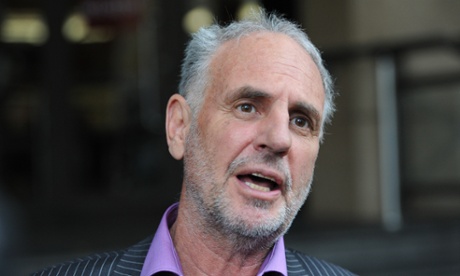Euthanasia advocates say if somebody is clinically depressed, the priority is to have the depression treated

Euthanasia advocates say Philip Nitschke’s decision to advise an apparently depressed but otherwise healthy Perth man who killed himself in May this year is a “grey area” and “pushing the boundaries” of the movement.
Nitschke, founder and director of the euthanasia group Exit International, is facing criticism after the ABC reported that it obtained emails showing that he communicated with Nigel Brayley, 45, in the weeks before the man took his own life using a euthanasia drug.
Before he died, Brayley, who had recently lost his job and whose wife had allegedly been murdered the previous year, admitted to Nitschke that he did not “honestly fit neatly under Exit’s charter of supporting a terminal medical illness”.
“However, I am suffering and have been now for some nine months,” he wrote. “I have sought medical and other forms of assistance but they are unable to help. All recognise and accept that my life will never be the same and that it’s only going to get worse, and I am not prepared to risk my families [sic] financial security and happyness [sic] by continuing along this same path.”
Nitschke rejected the suggestion that he had a duty of care to advise the man to seek psychiatric help.
“If a person comes along and says to me they’ve made a rational decision to end their life in two weeks, I don’t go along and say, ‘Oh, have you made a rational decision?’ ‘Do you think you better think about it, why don’t you go off and have a counsellor come and talk to you?’” he said.
“We don’t do that.”
Arnold Gillespie, a spokesman for Doctors for Voluntary Euthanasia Choice, said that Nitschke was “a pioneer in this area, and as such, like all pioneers, is breaking new ground”.
“The majority of doctors who believe that voluntary euthanasia has a place would be hesitant, would probably want to have some clause in there somewhere which says if a depressed person is asking for euthanasia, the appropriate way to go would be to try to treat the depression.
“[Nitschke] is pushing the boundaries in relation to those medical practitioners who are sympathetic to the idea of voluntary euthanasia in appropriate circumstances,” he said.
Gillespie was hesitant to say that Nitschke had a “duty of care” to Brayley to advise him to seek psychiatric help, but said: “In general, a doctor would think that management of the depression should certainly be high on the list of priorities.
“But of course, Dr Nitschke’s a licensed medical practitioner and … he made the call that he saw was right when confronted with this gentleman with whom he spoke for some weeks,” he said.
Another euthanasia campaigner from the same group, Rosemary Jones, said she was not aware of the circumstances of Brayley’s death, but that in principle she would not “support voluntary euthanasia for someone who is simply depressed”.
“If somebody is truly clinically depressed, they need to have their depression treated,” she said.
Jones said it was “everybody’s right to commit suicide, and if somebody makes the rational choice to suicide, then so be it”, but added: “You might say that if someone is depressed they’re incapable of rational thought … It’s a grey area.”
“Phil is a loose cannon. He is on his own in many respects, he’s not mainstream. In that sense he has to be admired for his courage,” she said.
Jeff Kennett, the chairman of the depression awareness charity Beyond Blue, said Nitschke’s refusal to refer Brayley to psychiatric help was “a gross breach of his Hippocratic oath as a doctor, and offensive to all standards of common decency”.
“The latest preliminary figures released by the Australian Bureau of Statistics for 2012 indicate 2,535 Australians took their own lives that year, which equates to seven deaths a day, twice our road toll,” Kennett said. “That figure is unacceptable, and we are all working to reduce it, except it seems Dr Nitschke.”
He said that Nitschke’s conduct, in his view, had done the voluntary euthanasia cause “a great deal of harm”.
“As a longtime supporter of euthanasia for the terminally ill, for those for whom the dignity of life has been lost, and under special conditions, I believe Dr Nitschke’s latest act has crossed the line of decency and professional conduct,” Kennett said.
• If you are in distress and would like assistance, please call Lifeline 13 11 14; BeyondBlue 1300 22 4636; or MensLine 1300 78 99 78 for support and information.
